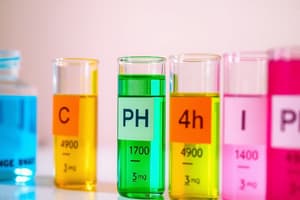Podcast
Questions and Answers
What happens when a strong acid combines with a strong base?
What happens when a strong acid combines with a strong base?
- Creation of a basic solution
- Formation of a weak salt
- Generation of an acidic solution
- Production of a neutral salt (correct)
Which type of acid completely dissociates in water?
Which type of acid completely dissociates in water?
- Neutral acid
- Weak acid
- Basic acid
- Strong acid (correct)
What is the pH of a solution with a salt containing the conjugate base from a weak acid?
What is the pH of a solution with a salt containing the conjugate base from a weak acid?
- Greater than 7 (correct)
- Less than 7
- Cannot be determined
- Exactly 7
In which scenario would a salt exhibit hydrolysis?
In which scenario would a salt exhibit hydrolysis?
What is the behavior of a weak acid when it dissociates in water?
What is the behavior of a weak acid when it dissociates in water?
Why does the pH of a solution with the salt calcium acetate (Ca(CH₃COO)₂) derived from acetic acid and acetate ion become basic?
Why does the pH of a solution with the salt calcium acetate (Ca(CH₃COO)₂) derived from acetic acid and acetate ion become basic?
Flashcards are hidden until you start studying
Study Notes
Properties of Acids and Their Derived Salts
To fully grasp the behavior of salts and their relation to acid-base characteristics, let's delve deeper into the property of acids when combined with various types of bases.
A strong acid, like hydrochloric acid (HCl), completely dissociates in water, releasing one mole of hydrogen ions (protons) per mole of the acid. Conversely, a weak acid only partially dissociates, producing fewer hydrogen ions.
When a strong acid and a strong base combine, a neutral salt forms, which has neither significant hydrolytic activity nor a tendency to ionize in water solutions. Examples of common neutral salts include sodium chloride (NaCl) and potassium nitrate (KNOₓ).
However, when a strong acid combines with a weak base, or vice versa, the resultant salt often exhibits hydrolysis, leading to changes in pH. If the salt contains a conjugate base from the weak acid, the pH will be greater than 7, indicating a basic solution. Contrarily, if the salt contains a conjugate acid from the weak base, the pH will be less than 7, suggesting an acidic solution.
For instance, calcium acetate (Ca(CH₃COO)₂) derives from a strong acid (HC₂H₃O₂ = acetic acid) and a weak base (CH₃COO− = acetate ion). Since acetate is a conjugate base, the solution is basic.
Similarly, salts formed from a strong base and a weak acid exhibit hydrolysis as well. The pH of these solutions is usually higher than 7 since the dominant species is the conjugate base from the weak acid, which acts as a weak base.
Notably, salts from strong bases and strong acids—such as sodium chloride (NaCl)—do not hydrolyze, maintaining a pH close to 7.
Understanding these concepts allows us to better appreciate the complexity of acid-base properties within salt solutions and anticipate the behaviors of novel compounds according to their acid strength and base character.
Studying That Suits You
Use AI to generate personalized quizzes and flashcards to suit your learning preferences.



